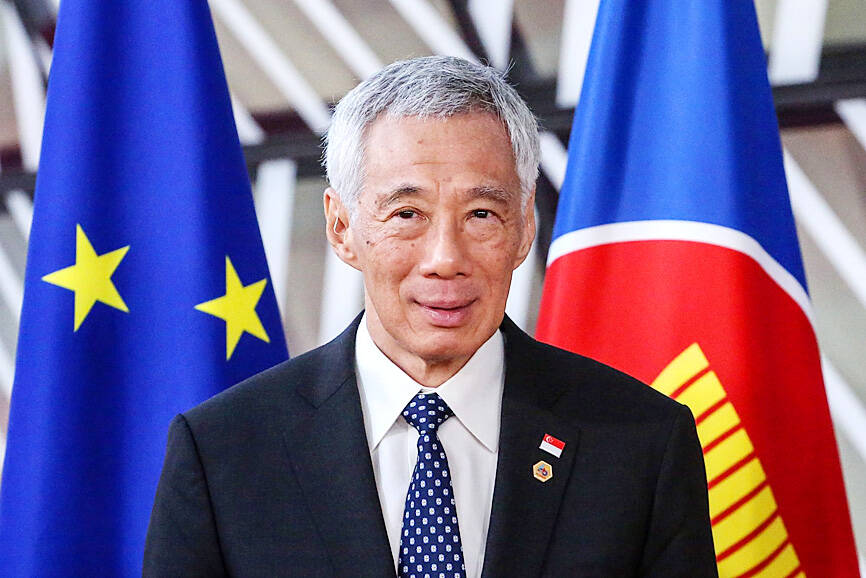As the world leaves the worst of inflation behind, Singaporean Prime Minister Lee Hsien Loong (李顯龍) warned of more pain in the new year from slowing economic growth.
“We must brace ourselves for the uncertainties ahead,” Lee said on Saturday in his New Year’s Eve message to Singaporeans, referring to a troubled international outlook. “Our economy will be affected.”
Trade-reliant Singapore expects to grow 3.5 percent last year, and Lee sees the pace decelerating 0.5 percent to 2.5 percent this year as many economies head toward a recession.

Photo: Bloomberg
Singapore’s government predicts that exports, which are more than one-and-a-half times the island’s GDP, to decline 2 percent this year in the worst-case scenario and to post zero growth in the best case.
Although China’s reopening could support commerce in Singapore, any gains might be offset by a decline in demand from other markets.
China is the city-state’s top goods trading partner, while the US is the third-biggest as of 2021.
Lee flagged the Russian invasion of Ukraine and US-China tensions as adding to the risks.
Singapore would take a cautious approach in increasing airline seat capacity as travel from China is restored, while holding back from joining others that have imposed tighter travel restrictions on visitors from the country, the Singaporean Ministry of Health said on Friday.
“How quickly China recovers from COVID-19 remains to be seen, while the US and the EU may well enter recession,” Lee said on Saturday, referring to the EU also staring at a downturn amid tight monetary conditions to fight price pressures.
The Monetary Authority of Singapore, which tightened policy five times since October 2021 to tame inflation, could leave its exchange rate settings unchanged at its next scheduled meeting in April to support the economy, Bloomberg Economics said.

Three experts in the high technology industry have said that US President Donald Trump’s pledge to impose higher tariffs on Taiwanese semiconductors is part of an effort to force Taiwan Semiconductor Manufacturing Co (TSMC, 台積電) to the negotiating table. In a speech to Republicans on Jan. 27, Trump said he intends to impose tariffs on Taiwan to bring chip production to the US. “The incentive is going to be they’re not going to want to pay a 25, 50 or even a 100 percent tax,” he said. Darson Chiu (邱達生), an economics professor at Taichung-based Tunghai University and director-general of

‘LEGACY CHIPS’: Chinese companies have dramatically increased mature chip production capacity, but the West’s drive for secure supply chains offers a lifeline for Taiwan When Powerchip Technology Corp (力晶科技) entered a deal with the eastern Chinese city of Hefei in 2015 to set up a new chip foundry, it hoped the move would help provide better access to the promising Chinese market. However, nine years later, that Chinese foundry, Nexchip Semiconductor Corp (合晶集成), has become one of its biggest rivals in the legacy chip space, leveraging steep discounts after Beijing’s localization call forced Powerchip to give up the once-lucrative business making integrated circuits for Chinese flat panels. Nexchip is among Chinese foundries quickly winning market share in the crucial US$56.3 billion industry of so-called legacy

Hon Hai Precision Industry Co (鴻海精密) is reportedly making another pass at Nissan Motor Co, as the Japanese automaker's tie-up with Honda Motor Co falls apart. Nissan shares rose as much as 6 percent after Taiwan’s Central News Agency reported that Hon Hai chairman Young Liu (劉揚偉) instructed former Nissan executive Jun Seki to connect with French carmaker Renault SA, which holds about 36 percent of Nissan’s stock. Hon Hai, the Taiwanese iPhone-maker also known as Foxconn Technology Group (富士康科技集團), was exploring an investment or buyout of Nissan last year, but backed off in December after the Japanese carmaker penned a deal

WASHINGTON POLICY: Tariffs of 10 percent or more and other new costs are tipped to hit shipments of small parcels, cutting export growth by 1.3 percentage points The decision by US President Donald Trump to ban Chinese companies from using a US tariff loophole would hit tens of billions of dollars of trade and reduce China’s economic growth this year, according to new estimates by economists at Nomura Holdings Inc. According to Nomura’s estimates, last year companies such as Shein (希音) and PDD Holdings Inc’s (拼多多控股) Temu shipped US$46 billion of small parcels to the US to take advantage of the rule that allows items with a declared value under US$800 to enter the US tariff-free. Tariffs of 10 percent or more and other new costs would slash such